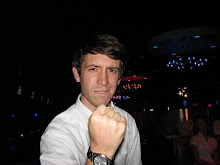When We Rise It's Like Strawberry Fields
Congratulations to Mr. John Middleton for correctly naming "Pride (In the Name of Love)" by U2 as the Friday Song of the Day.
If you own a fire-extinguisher shop in the Bay Area, you might be doing brisk business in the next two days.
If you own a fire-extinguisher shop in the Bay Area, you might be doing brisk business in the next two days.

After numerous attempts yesterday by protesters in London to disrupt the Olympic Torch relay, the eternal flame did not have an easier journey today in Paris.
What was supposed to be a majestic procession for the Olympic torch through the French capital was disrupted Monday as thousands of people from around Europe, many with Tibetan flags, massed to protest the passage of the flame, forcing police officers to bring the torch onto a bus to try to protect it and causing the torch to be extinguished at least once.
Following the events of the past two days, the torch will arrive in San Francisco on Wednesday as part of the sole American stop on the worldwide tour prior to the Beijing Games in August. Given the level of political activism in the Bay Area, it seems that the question is not if the relay will be disrupted by further protests but how the law enforcement authorities will handle such actions.
 During a trip to San Francisco four years ago, I passed by City Hall during a protest rally related to the Chinese occupation of Tibet. I've never been much of betting man, but I would not be surprised in the least to see some of those participants involved in the torch relay on Wednesday but perhaps not in any kind of official capacity.
During a trip to San Francisco four years ago, I passed by City Hall during a protest rally related to the Chinese occupation of Tibet. I've never been much of betting man, but I would not be surprised in the least to see some of those participants involved in the torch relay on Wednesday but perhaps not in any kind of official capacity.
Almost four months out from the Opening Ceremonies on August 8th, world leaders are already making preliminary statements regarding possible boycotts of portions of the Games, although none have gone as far as to state they will entirely withdraw their team from the Olympics. I am of the mind that the issue of protesting the actions of the Chinese government in Tibet, Darfur, and China itself, should lie with the individual athletes.

Just as the image of Tommie Smith and John Carlos bowing their heads and raising their fists during "The Star Spangled Banner" was burned into the minds of Americans in 1968, the choice of whether to convey such a message of dissent should be placed in the hands of each Olympian in Beijing rather than subsumed under the type of blanket protest action that Jimmy Carter utilized against the U.S.S.R. in 1980 in response to the Soviet invasion of Afghanistan.
After reading David Halberstam's The Amateurs and developing some sort of understanding for the depth of disappointment that many American Olympians felt in 1980 after Carter's announcement, it seems as though it would be a colossal mistake for any world leader to completely withdraw their nation's athletes from Beijing with the aim of rebuking Chinese policy.
 During a trip to San Francisco four years ago, I passed by City Hall during a protest rally related to the Chinese occupation of Tibet. I've never been much of betting man, but I would not be surprised in the least to see some of those participants involved in the torch relay on Wednesday but perhaps not in any kind of official capacity.
During a trip to San Francisco four years ago, I passed by City Hall during a protest rally related to the Chinese occupation of Tibet. I've never been much of betting man, but I would not be surprised in the least to see some of those participants involved in the torch relay on Wednesday but perhaps not in any kind of official capacity.Almost four months out from the Opening Ceremonies on August 8th, world leaders are already making preliminary statements regarding possible boycotts of portions of the Games, although none have gone as far as to state they will entirely withdraw their team from the Olympics. I am of the mind that the issue of protesting the actions of the Chinese government in Tibet, Darfur, and China itself, should lie with the individual athletes.

Just as the image of Tommie Smith and John Carlos bowing their heads and raising their fists during "The Star Spangled Banner" was burned into the minds of Americans in 1968, the choice of whether to convey such a message of dissent should be placed in the hands of each Olympian in Beijing rather than subsumed under the type of blanket protest action that Jimmy Carter utilized against the U.S.S.R. in 1980 in response to the Soviet invasion of Afghanistan.
After reading David Halberstam's The Amateurs and developing some sort of understanding for the depth of disappointment that many American Olympians felt in 1980 after Carter's announcement, it seems as though it would be a colossal mistake for any world leader to completely withdraw their nation's athletes from Beijing with the aim of rebuking Chinese policy.
Labels: 2008 Beijing Olympics, David Halberstam


0 Comments:
Post a Comment
<< Home